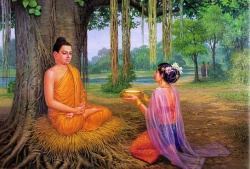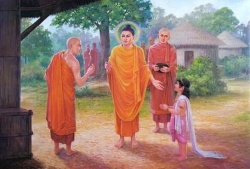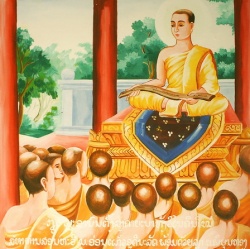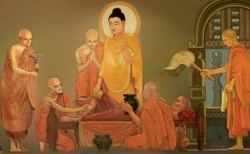A Talk on Preaching
In order to revive Buddhism in India, it was necessary to preach the Dharma vigorously, and all Buddhists must appreciate the efforts made by pioneers to do this. One would like to follow in their noble steps, but before this can be done, certain spiritual achievements are required. This article is to give an idea of the various levels of preaching, the attainments needed by preachers, and how these different types of preaching affect various audiences.
It is quite well known that one does not preach anything for one's own reputation but only for the sake of others' wisdom life. That is why the preacher is modest in speech, his practice always surpasses his words until he reaches full Enlightenment. He practises before he preaches, and he preaches after he practises, and is always careful not to preach more than he has
practised. Therefore, the difficulty is not how to preach well but what wisdom experiences or inner merits are to be used as a basis of preaching. It is certain that where there is a preacher there will also be many to check him; this is especially true of the Buddhist preacher who is not only checked by his audience but also by the eight classes of Devas and Nagas. Results of preaching may be well borne in mind, and come to greater or lesser fruition both here and hereafter. We cannot but survey this matter carefully.
According to my idea, there are six stages of preaching classified not according to external conditions, but according to the mental states involved.
I
The first stage of preaching is based upon the Knowledge of Hearing or Reading, and that of Thinking or Speculation.
The Tripitaka should be read thoroughly. Scriptures of the Triyana should be learned without any limitation, not confining oneself to only one of these ways but learning from all three Hinayana, Mahayana, and the Vajrayana. Pali, the fundamental language of Theravada of the Southern Hinayana School, Sanskrit, a language of the Mahayana, and the Chinese and Tibetan languages of both the Mahayana and the Vajrayana, together with the language of the audience to whom one will preach, should all be learned very well. All this is knowledge of hearing only (sruta maya prajna). Regarding the knowledge of thinking (cinta maya prajna), the preacher should carefully discriminate between pure Buddhism and the religions of outsiders. He should understand that there are no contradictions among the Three Vehicles or Yanas within Buddhadhama although each has its own distinctive teachings. He should know which doctrine will be suitable for which kind of student, choosing teachings carefully from amongst the Triyana to suit peoples' capacities, just as a good physician should know what kind of medicine will be beneficial for his different patients. Also he should distinguish the definitions of the One Hundred Dharmas of the Idealist School (Vijnanavada Abhidharma), and having applied these in his life, come to know the difference between common sense of worldly knowledge, of people, things and places, and the Dharmic knowledge underlying them. He should be skilled in harmonizing the different doctrines of all the schools, and knowing: the cause and effect of the five sorrows, the sorrows and their cure, and the correct time for any student to learn particular disciplines or yogas. All these varying factors should be accomplished very thoroughly.
II
The second stage of preaching which is also essential is to have a Concentrated Sympathy for Worldly Sufferers. The preacher now has a little more practical knowledge of the Southern School than at the first stage. Why is a certain preacher able to turn the audience's eyes inward, each man to his own heart? And how does he cause them not only to listen with their ears but also to react in their hearts? He has the power to hold both the peaceful rhythms and the fearful pulsations of the hearts of the audience. Even the psychic atmosphere of the whole meeting is in the preacher's hands. Nobody has the power to escape from his influence. This is all because he himself has practiced the Four Noble Truths. Such a one knows not by words alone the impermanence and the pains of samsara (the world of birth and death), but has realized their truth in the clarity of mind after success in concentration over a long period. He has shed countless tears in his meditations on the pains of samsara so it is certain that he would elicit tears from his audience. He who has the real sympathy within, may also have the manifestation of tears without. He who preaches the pains of transmigration without tears on his own face, nor causes them on the face of the audience, is still a preacher of the first stage.
III
The third stage of preaching is to have the Power to Develop the Audiences’ Bodhi Hearts as a complement to his sympathy for their pain. This means the preacher has already achieved success in meditation of the Bodhicitta (wisdom heart) before he starts to preach. He has enlarged the four boundless hearts (catvari apramanani=Brahma viharas) of the Southern School to become the great compassion of the Mahayana, and perfected the extension of the non egoism of the human being (pudgala sunyata) to that of all dharmas (dharma sunyata) in the manner of the Mahayanist. He has known and experienced that the Tathagatagarbha is in everybody and that the Dharmakaya includes all sentient beings and so, all audiences are within him. He has prayed for all sentient beings, he has worshipped all the Buddhas and Bodhisattvas, repeated their mantras and practised all their meditations, all for the sake of sentient beings. Thus, he embraces all audiences as himself, just as in his practice he had embraced all sentient beings. As speech is the sound of the heart, and his heart has become the Bodhicitta, therefore whenever he lectures, he is in the meditation of the unity of the Dharmakaya with his audiences and whatever he feels, the audiences feel; also, whatever he likes to speak about, all audiences like to hear. Sympathy now is not only on the side of the preacher, but on both sides (from the audiences as well). By the power of the achieved Bodhi heart, he is able to make feeble willed minds stand upon the foundation of Tathagatagarbha. If the preacher did not keep the achievement of the Bodhi heart and know how to bring it into subjection, though he preached to others, he himself would be a castaway. The reason that the ancients seldom give utterance to their words was that they feared lest their actions should not live up to them. Therefore, a Buddhist preacher should develop his own Bodhiheart before he preaches. Bodhi heart is the one virtue to bring about development of all virtues. He who is achieved in Bodhi heart is sure to give appropriate teaching to others and will usually hit upon the right point at the right time for the spiritual growth of others.
IV
In this Kali Age, we can seldom get more excellent conditions of preaching than shown in the above three stages; yet we easily get the special audiences which hold to profane intelligence and superstitiously believe in 'science', and who, moreover, are difficult to convert. Therefore in the fourth stage of preaching The Realization Assurance of Bodhisattvas is necessary. There are Ten Stages of Bodhisattvas and as they have been dealt with elaborately elsewhere, and as our subject is limited to preaching, they need not be introduced here. When the realizational assurance of a Bodhisattva is achieved, then he is in contact with at least one hundred Buddhas. He, therefore, is not only acquainted with audiences but is also acquainted with and glorified by the Buddhas. Even the preachers of religions leading only to heaven (such as [[Wikipedia:Christianity|Christianity]] and Islam) should get the anointment of their Lords, so how much more should the Buddhist preacher truly get through the grace of the Buddhas? Otherwise, if the preacher is without realizational assurance approved by the Buddhas, then he is just talking in darkness, as Longfellow says in his song:
- Ships that pass in the night, and speak to each other in passing.
- Only a signal shown and a distant voice in the darkness.
- So on the ocean of life we pass and speak to one another.
- Only a look and a voice; the darkness again a silence.
But if he has the Bodhi heart as well as realizational assurance, he is then the center of the meeting, a Dharmabattery which all the graces of the Buddhas and the faith of all the audiences contact alternately. Through him is formed a Buddha Dharma current and he would then have the four unlimited Bodhisattva powers of interpretation: Dharma the letter of the Law; Artha its meaning; Nirukti ability in any language or form of expression; and Pratibhana eloquence or pleasure in speaking. With such powers of preaching the special audiences of profane intelligence might be convinced.
V
All the exoteric schools lay most stress on psychical meditation of great compassion and on Buddha wisdom of non egoism, but do nothing with the physical practices. If one has practised only these exoteric teachings then not only is it impossible to subdue outsiders such as the Taoists of China and the Hindus of India, but also one is unable to discuss or to dispute with them. Again, there are some special audiences who only believe when they see displayed the supernormal powers of the five Abhijna; they have no faith in mere preaching. Although the Bodhisattvas of the exoteric schools have these five peaceful secret powers, yet on the occasion of wrathful magic concerning the powers coming from the wisdom energy and from the submission of the five poisons (the power from the 6th Abhijna, the extinction of the four outflows or asravas), they are not acquainted with that practice. It is only the Vajrasattva who has practised the esoteric yogas and so perfectly attained all six Abhijnas and who has control over both types of powers. Such a one is able with his exhalations during preaching to subdue the unbelievers, and when he draws in his breath also takes up the sins of outsiders, resting only when his breath is held. Sometimes his outbreathing becomes wisdom light which has power to subdue the unsubdued, and to make the unbelievers believe. Whatever he preaches will be instantly proved by his own realization, as when Marpa preached Mahadeva that Vajra's mandala immediately appeared; Chunpolongo preached Tummo at once Tummo appeared, or again when Milarepa preached the nature of voidness he was able instantly to perform voidness actions. At that time he penetrated through the rocky mountain and went out of it as though he passed through empty space, and sat on the sky as if he sat on a stone. Many such examples may be found in the esoteric sage's biographies. In short, the importance of this fifth stage is The Magic Power of the Vajrasattva.
VI
Full Enlightenment is the final and ultimate source of all these stages of preaching. It is only a Buddha who has the Ten Powers and Eighteen Avenikadharmas, and these differentiate Him from the Bodhisattvas. Besides the second and fourth avenika dharmas which concern directly a Buddha's mouth and speech, all the other sixteen are more or less indirectly related to preaching. It is needless to say that a Buddha’s preaching is the most perfect and excellent. Their preachings are all true, credible, immutable, and without extravagance and chimaera. In one and the same preaching of a Buddha, all kinds of sentient beings may hear Dharma fruitful for themselves as individuals. He does not preach only for human beings but also for the benefit of devas and nagas. Our Lord was invited by the gods of the heavens and the kings of the dragons to preach in these realms and consequently the Tripitakas to be found there are more extensive than those possessed by human beings.
In conclusion, it should be stressed that it is only people who have committed abundant sinful karmas against the Blessed One and His Dharma in many past lives that may now be left outside His conversion. But it must be added that there is no preacher who could convert all sentient beings as the accumulation of their evil karmas is inconceivable; whereas any preaching is sufficient to convert those persons whose good conditions of Dharma have matured at that very moment and so whose time of comprehending the teaching has come.
Even for Buddhas, three things are impossible. They cannot annihilate the causality of Karma and its fruits,nor can they save others unconditionally, and they cannot exhaust the realm of the living (samsara).
Could any preaching be worse than the evil song of a prostitute? Yet the monk who heard that song said, "As you have no mind on me, I also have no mind on you" and so obtained the Ch'an intuitive understanding. Could any preaching be worse than the quarrel of a butcher? Yet the monk who heard that quarrel said, "There is nowhere that is not lean pork" and realized Ch'an. Birds sing, wind blows, stream flows, flowers bloom, and clouds move everything is the good preaching of the broad and long tongue of the Dharmakaya for those persons whose good conditions of Dharma have come to maturity and who are ripe for understanding. Nevertheless, we Buddhist preachers should do our utmost in preaching for the Buddhadharma's sake. The conditions of the above six stages of preaching should be accumulated through practices, the more conditions the better and the sooner the better.



